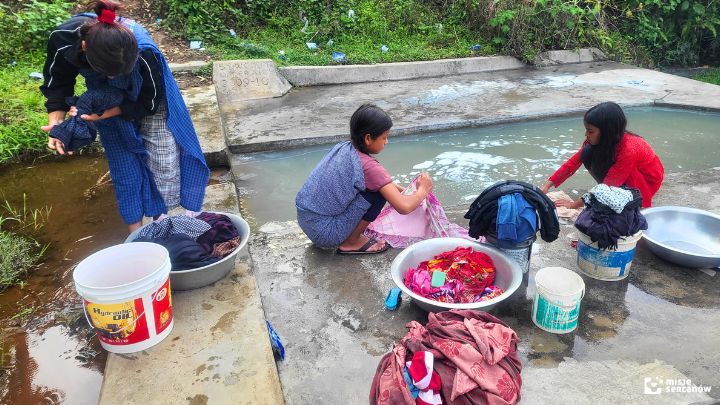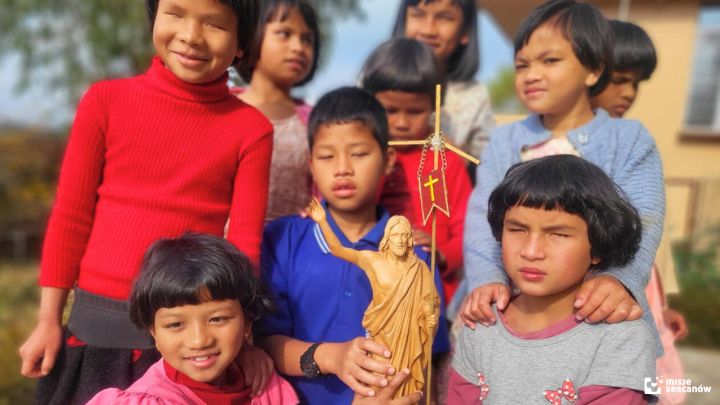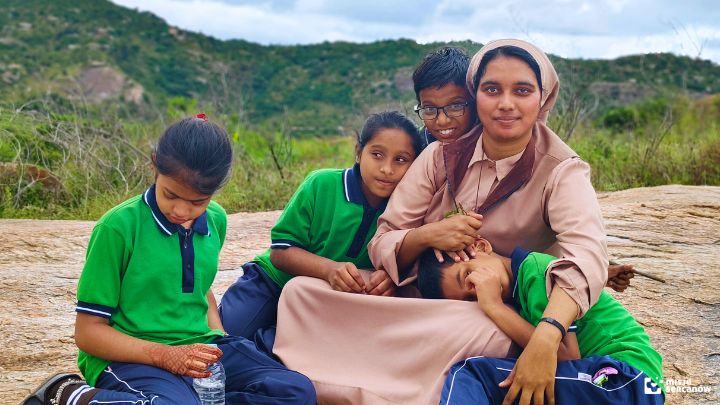Nongbah is a small town in Meghalaya state in northeastern India. There, the Congregation of the Franciscan Sisters Servants of the Cross runs a boarding school for 50 blind and visually impaired children between the ages of 4 and 17. The school is called Jyothi Seva - Service to the Light.
From the perspective of a missionary in Meghalaya, there are specific cultural and regional characteristics that shape the approach to education in this region. The local people of Meghalaya are mainly engaged in agriculture, handicrafts and small-scale trade. This often makes education a secondary priority, especially for children with disabilities, who are even "hidden" at home due to social stigma or lack of access to specialized institutions. In addition, the region's mountainous terrain and remote areas make it difficult for families to access schools, which poses logistical challenges.
Another major problem in the region is the lack of resources and infrastructure. As Sister Amlee Thiraviam FSK points out, a particular challenge in the area is access to potable water:
Most people living in Meghalaya state depend on rainwater. It is collected in reservoirs and such water is used for laundry, washing, and daily use at home. As for drinking water, people use mountain streams flowing into the valley. There is a water supply system of sorts in the cities, but in villages like Nongbah one has to walk for drinking water.
People take their laundry with them to wash it in the stream, and carry drinking water for their family on the way back in large vessels on their backs. Nongbah sisters and students at least do their laundry in the same way.

In 2010, the sisters asked the local government for permission to dig a well. However, the well is only 4.5 meters deep. During the winter season, from November to February, the water level drops. In addition, in February there is a strong wind that blows away the remaining residual water, so there is not enough of it even for drinking. When this spring dries up, the sisters are forced to buy drinking water, and this costs as much as 8 euros a day.
In March and April, we are facing a severe water shortage. This crisis forces us to send students home, interrupting their education... At home, many of them do not receive enough food and proper care. Children return to school weakened and malnourished. This situation seriously affects their health, well-being and ability to concentrate on learning
- adds sister Amlee.
For several years now, the Franciscan Sisters have been asking for permission to dig another well, but the authorities claim that drilling destroys natural water sources. Now they have finally succeeded in getting permission to dig a well by hand.
We need to go at least 10 meters deep, but if that's not enough, we'll dig further. The entire investment is an unattainable 18 thousand euros for us, but we hope that with God's grace and the help of Dehonian Donors, on whom we can always count, we will manage to provide our sisters and children with a constant source of clean and healthy water.

Nongbah students are mainly from poor, underprivileged families. Some are orphans or half-orphans who are cared for by aunts and uncles. Education, food, medical care, clothing and all possible care are free for all students, regardless of their caste or religion.
Jyothi Seva students follow the government curriculum, additionally participating in special classes for the blind, such as learning to write and read Braille, computer skills, daily living skills and crafts, orientation and mobility. The children also have regular classes in dance, vocal music, instruments - flute and piano. As the sisters point out, at Nongbah the children also learn honesty and responsibility, love for God and their neighbors. They learn how to overcome caste and religious divisions - here Hindus, Muslims and Christians live like brothers and sisters.

Read the full interview with Sister Amlee Thiraviam FSK about this project and the work of the Franciscan Sisters in India, and help us build a well of clean drinking water for the children of Nongbah.
And if you want to learn more about the Jyothi Seva School in India, read about our Adoption of Light project.



